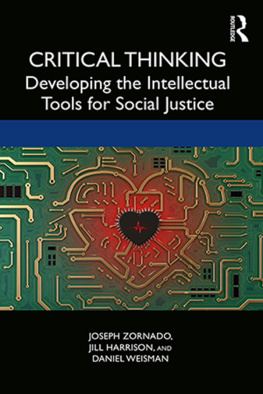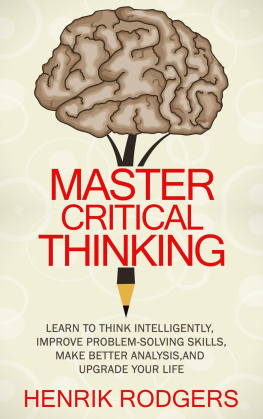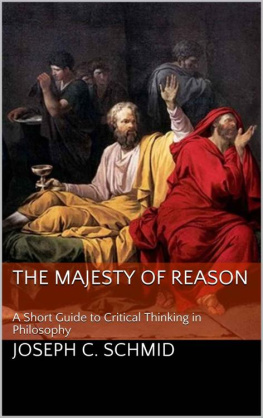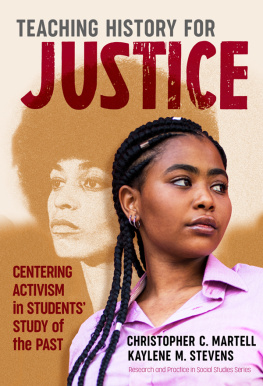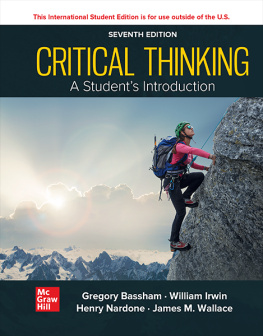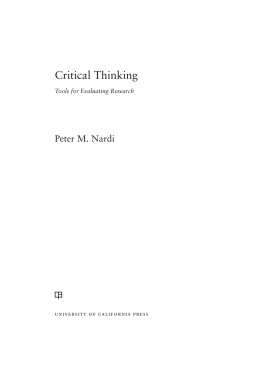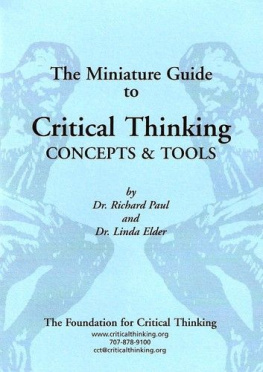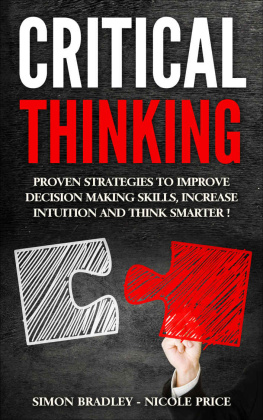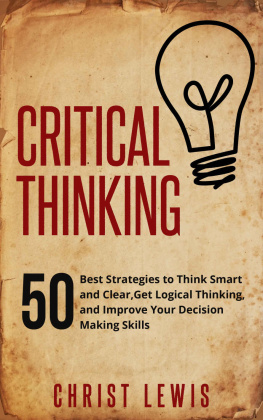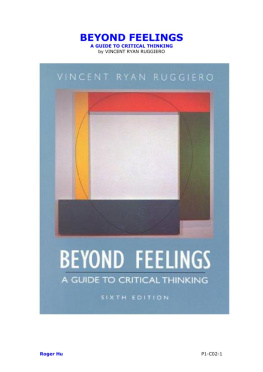CRITICAL THINKING
Critical Thinking presents, defines and explains the intellectual skills and habits of mind that comprise critical thinking and its relationship to social justice. Each of the sequential chapters includes detailed examples and learning exercises that guide the reader step by step from intellectual competency, to critical thinking, to cultural cognition, and to the critical awareness necessary for social justice.
The book documents and explains the scope of multiple crises facing society today, including environmental destruction, income and wealth inequality, large-scale human migration, and the rise of autocratic governments. It shows how critical thinking, cultural cognition, and critical awareness lead to the possibility of solutions grounded in social justice.
All college students, especially those in the social sciences and humanities, will develop the intellectual skills necessary for critically engaging information in order to become active learners and effective agents in the world. This book complements information in introductory, interdisciplinary, or discipline-specific courses. Every chapter contains examples and exercises that can be assigned as homework, adopted as in-class activities, or both. The Conclusion also contains exercises for developing writing and basic mathematical competency skills.
Joseph Zornado is professor of English at Rhode Island College. He has published fiction, scholarly articles on literature and film, the books Inventing the Child (2007) and Disney and the Dialectic of Desire (2017) along with co-authored textbooks for social work and justice studies.
Jill Harrison is professor of Sociology at Rhode Island College, teaching justice studies courses at undergraduate and graduate levels. Scholarly publications include research on incarcerated men with a history of trauma and recidivism, and co-authoring Professional Writing for the Criminal Justice System (2017).
Daniel Weisman is professor emeritus of Social Work at Rhode Island College and has published on civil liberties, public policy, and pedagogy, notably Professional Writing for Social Work Practice (2018) and Professional Writing for the Criminal Justice System (2017). His practice includes policy advocacy and program evaluation.
First published 2020
by Routledge
2 Park Square, Milton Park, Abingdon, Oxon OX14 4RN
and by Routledge
52 Vanderbilt Avenue, New York, NY 10017
Routledge is an imprint of the Taylor & Francis Group, an informa business
2020 Joseph Zornado, Jill Harrison, and Dan Weisman
The right of Joseph Zornado, Jill Harrison, and Dan Weisman to be identified as authors of this work has been asserted by them in accordance with sections 77 and 78 of the Copyright, Designs and Patents Act 1988.
All rights reserved. No part of this book may be reprinted or reproduced or utilized in any form or by any electronic, mechanical, or other means, now known or hereafter invented, including photocopying and recording, or in any information storage or retrieval system, without permission in writing from the publishers.
Trademark notice: Product or corporate names may be trademarks or registered trademarks, and are used only for identification and explanation without intent to infringe.
British Library Cataloguing-in-Publication Data
A catalogue record for this book is available from the British Library
Library of Congress Cataloging-in-Publication Data
Names: Zornado, Joseph L., author. | Harrison, Jill, 1963- author. | Weisman, Daniel, author.
Title: Critical thinking : developing the intellectual tools for social justice / Joseph Zornado, Jill Harrison and Daniel Weisman.
Description: First Edition. | New York : Routledge, 2019. | Includes bibliographical references and index.
Identifiers: LCCN 2019033753 (print) | LCCN 2019033754 (ebook)
Subjects: LCSH: Social justice. | Restorative justice. | Critical thinking.
Classification: LCC HM671 .Z67 2019 (print) | LCC HM671 (ebook) |DDC 303.3/72--dc23
LC record available at https://lccn.loc.gov/2019033753
LC ebook record available at https://lccn.loc.gov/2019033754
ISBN: 978-1-138-34284-2 (hbk)
ISBN: 978-0-429-43954-4 (pbk)
ISBN: 978-1-138-34289-7 (ebk)
To the United Nations Universal Declaration of Human Rights, adopted by the General Assembly of the United Nations on December 10th, 1948 as a result of the disasters brought upon the world by war.
Why this book?
Welcome to an empowering journey that, we hope, will change the way you think about the world around you and your place in it. We wrote this book as a way to address the very social crises that have their roots in fear-based thinking often informed by nostalgia and superstition. Higher education is more than a way to pass on job training skills; we believe in lifelong learning. While higher education has always been about more than job training (though this is important), a college education means that we have learned to take responsibility for our own learning. We have become professional thinkers, as it were, curious, always learning, questioning, and seeking out evidence whenever possible to support important conclusions. What this means and how to go about doing it is the reason for this book. The higher mind, the critical mind, the enlightened mind, that mind that knows itself, the third-eye of wisdom, and many other traditions have named our innate capacity for critical awareness. This book breaks down critical awareness as an assemblage of practical thinking skills from which emerges the possibility for social justice as a restorative social practice.
Developing the critical thinking tools for social justice is a journey rather than a destination. Why? Because the one constant in life is change, and today change comes at a pace difficult to imagine even a generation ago. We are drowning in information, and our attempts to keep up with it have us locked into devices that shape how we think by offering to do our thinking for us.
More recently, the internet as a purveyor of information has come into question. It is all hackable, all trollablecapable of disruptive, provocative posts. The dilemma is difficult and many-layered. One persons truth is another persons fake news. The information under consideration seems to hardly matter, but if it did, we might discover the information to be worthless and unreliable. Such is the danger of taking critical thinking seriously. Many truths crumble while new truths, provisional and subject to change, emerge.
We wrote this book because of the substantial personal and societal consequences at stake. The Information Age is quickly becoming an age of misinformation. Unfortunately, as we grow up how we learn to think usually falls short of what we define in this book as critical thinking. And where critical thinking is lacking, social justice finds little traction. It is indeed a crisis of critical thinking that imperils us all. We believe that critical thinking, while an innate capacity of the human mind, must be learned and practiced.
We should note that critical thinking has no political agenda. One can use evidence-based reason and the scientific method to build bombs designed to wipe out populations. Social justice, on the other hand, simultaneously arises as an idea often with a political agenda. For social justice to occur, politics and policies usually must change. According to the United Nations social justice is an underlying principle for peaceful and prosperous coexistence and the promotion of human dignity. Critical thinking serves as a way to promote social justice, particularly as we seek to understand the need for social change. Critical thinking is a tool while social justice is a goal. We present the habits of mind upon which critical thinking depend while at the same time build a case for social justice.

